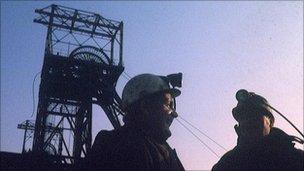Universities' study looks at coal mining's human cost
- Published

The coal industry is regarded as one of the most dangerous professions
The human cost of coal mining and the price paid by miners in sickness, injury and disability is being studied in a new £1m research project.
Findings from the five-year programme will "challenge understandings of disability", claim academics.
Their work explore the history of disability in the coal industry between 1780 and 1948.
The project is bringing together a team from Aberystwyth, Swansea, Strathclyde and Northumbria universities.
Charitable foundation the Wellcome Trust has awarded the project the funding, beginning this month and running until September 2016.
Mining is regarded as one of the most dangerous professions.
Health and Safety Executive statistics show there had been seven deaths in mining accidents in the UK since 2007, before an incident last month in which four men died when Gleision Colliery in the Swansea Valley flooded.
That was followed by the death of a miner after a roof fall at Kellingley Colliery, near Knottingley, north Yorkshire. A second man was trapped but was rescued.
Meanwhile, a miner was rescued from a pit in the Neath Valley on Friday and flown to hospital in Cardiff after he became trapped under rubble following a small roof collapse.
Harmful industries
The universities' project is being led by Prof Anne Borsay of Swansea University and is called Disability and Industrial Society: A Comparative Cultural History of British Coalfields.
Researchers said it would produce a number of books and articles, as well as a web page of statistical data.
It will also include public lectures, a roadshow, an exhibition, and a workshop for health and social care professionals.
Dr Steven Thompson of Aberystwyth University, who is taking part in the project, said: "This is an exciting and ambitious project that we hope will make an important contribution to understandings of disability in contemporary society.
"We aim to focus our attention on one of the most iconic and indeed harmful industries of the industrial revolution, and show how disability was understood and experienced in this particular area of British life.
Eligibility for assistance
"A team of researchers will undertake detailed historical study over the next few years to reveal the human cost of coal and the price paid in sickness, injury and disability."
Prof Borsay said her team was excited by the challenges.
Dr David Turner of Swansea University said: "For disabled people today, the project's findings will challenge understandings of disability by demonstrating that attitudes and policies are socially constructed, and therefore open to change.
"The project will also contribute to current debates about welfare relief and ability to work by revealing the changing role of social, political and medical factors in determining eligibility for assistance."
- Published14 October 2011
- Published27 September 2011
- Published28 September 2011